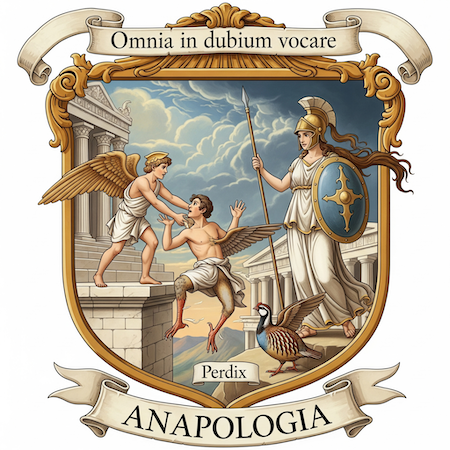Anapologia, Minerva, Icarus and Perdix
what's the connection?
Daedalus, Icarus and Meleager
What the hell does Icarus have to do with Anapologia, Minerva and Perdix? I hear you ask. I only "remember" the story from translating the Latin, 60 years ago, from a book we knew as "Daedalus, Icarus and Meleager" and apparently is really known as "Metamorphoses" by Ovid. I mistakenly remembered that Icarus was a jealous prick and pushed his poor cousin Perdix from the Citadel of Minerva (Perdix was famously inspired to invent the saw, by finding a fish skeleton). Apparently I was mistaken. It was his uncle Daedalus himself who pushed Perdix. Perdix was so smart he was outshining Daedalus (his supposed teacher). Daedalus thought Perdix was a rotten little smartarse so attempted the nepoticide. I apologise to Icarus.
Luckily for Perdix, Minerva had the hots for smart guys and turned him into the "chattering Partridge" as he fell, thus saving his life. And the story goes that Perdix (partridge) avoided high places from then on and even built their nests on the ground.

Icarus was framed (by me). It was Daedalus who shoved poor Perdix from the Citadel. Ironic really that feathers saved Daedalus' nephew but were the downfall (get it?) of his son Icarus.
This was in Latin class. We didn't just translate Ovid for fun. No. We translated pornographic Latin writings that we found in the Library, for fun. All I can remember is that it was about acolytes of some Goddess (probably the Roman version of Cybele) who required "penises twice the size of any scroll Caesar has brought back from Carthage to quench the desire in their <redacted>". This was on rainy days when the Library was relatively warm and dry.
We chose Minerva and Athena as our patron goddesses because the Roman Minerva and Greek Athena were both goddesses of Wisdom and Warfare. We adopted them choosing to interpret the "Warfare" as being a war against Ignorance fought by shining a light into the darkness accompanied by owls (presumably in an advisory capacity).
